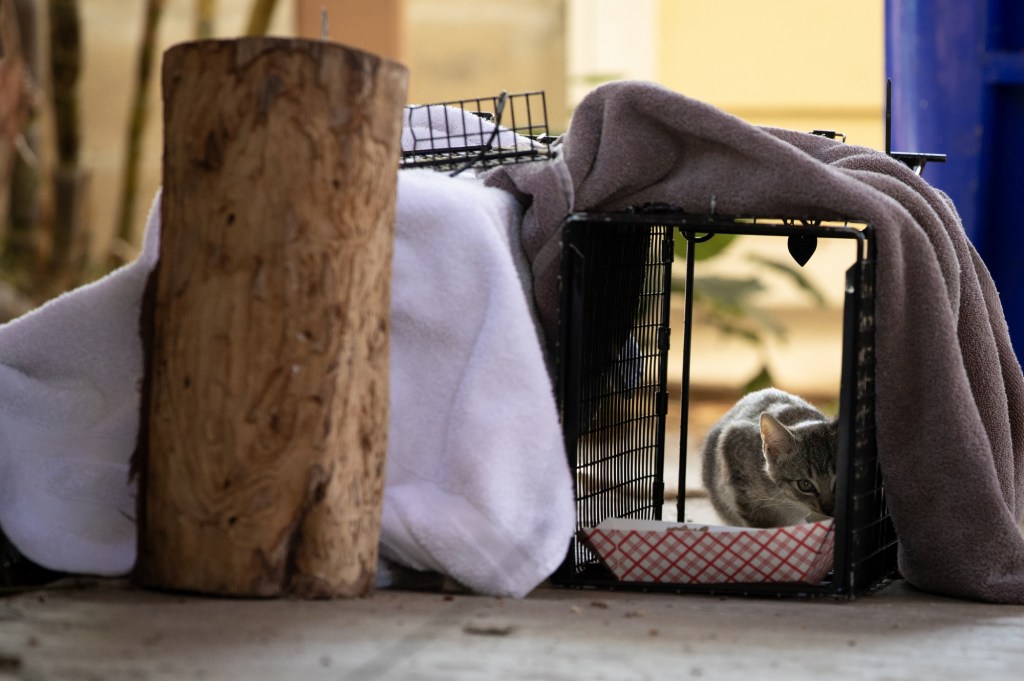

The San Diego Humane Society’s policy of turning away domesticated cats roaming outside and instead returning them back to where they were found without ensuring they have a caretaker violates the law, a judge ruled Friday.
San Diego Superior Court Judge Katherine Bacal’s decision following a bench trial is a victory for the animal rights groups and people who sued the organization, alleging its policy fails to take in the friendly, adoptable cats — which may be stray or abandoned — that people find and bring to the shelter, and instead routes the animals to a program for unowned, outdoor cats.
Bacal also said the agency’s policy of assessing only kittens brought to them — as opposed to all cats — to determine how social they are is “too narrow.”
What happens next is a question. Attorneys Bryan Pease and Parisa Ijadi-Maghsoodi, who represented the plaintiffs, said the ruling means the San Diego Humane Society will now be required to take in domesticated cats. The San Diego Humane Society said that until it gets further clarification from the court, the program will remain in place without changes.
The plaintiffs’ attorneys argued at trial — which lasted 12 days spanning several months — that the shelter abandons domesticated cats in violation of the law, and that releasing them to live outdoors without people ensuring their well-being puts them in danger. The suit accused the San Diego Humane Society — which handles animal control services for San Diego and several other cities — of violating the state’s unfair business practices statute.
Ijadi-Maghsoodi said the verdict is an “excellent outcome for the cats and for the plaintiffs.” Pease said the decision “is major for the cats that are falling through the cracks. But by no means is this dismantling their whole Community Cat Program, nor was that ever the intention.”
In court documents, the San Diego Humane Society argued the program is science-based, developed by professionals and best for cats that would otherwise suffer in shelter cages. According to trial testimony, the two biggest objectives of the program are to ensure the health and well-being of the cats, and to stabilize and reduce the cat population.
In a statement after the verdict, the San Diego Humane Society said it stands behind the science of its Community Cats Program.
“We remain unwavering in our belief that this program is the best solution for community cats, and that it is legal under California law,” it said, in part.
“This is only the first chapter in this case, and we expect that a future court will rule differently and understand that the Community Cat Program is both legal and the most humane way to save the lives of cats,” it later added. “In the meantime, the Community Cat Program remains in force as a lifesaving effort for animals in San Diego County.”
In issuing her ruling, Bacal said she was aware that everyone who testified “wants what they believe is best for the cat population and cats in general.” The difference she said, results from diverging points of view — the organization coming at it from a shelter cat population perspective and the plaintiffs considering the animals with which they had come into contact.
“It is not the court’s obligation to decide what is best for the animals,” Bacal said. “The only obligation is to decide what is lawful.”
Under the Community Cats Program, if a healthy cat is found and brought to the organization, staffers look for proof of ownership such as a collar or microchip. If they establish it is or has been owned, the cat goes into the shelter. If no verified ownership is found, the animal is routed into the program, where cats are sterilized, vaccinated, given preventative treatments, have an ear clipped to mark them, and then are returned outdoors to the area where they were found.
The program started as a pilot but has been fully in place since March 2021. More than 18,000 animals in the region have been labeled community cats.
Pease argued that the standard of proof of prior ownership was too high. “Requiring this insurmountable ‘verifiable’ proof standard that a cat was recently owned or abandoned means that a lot of cats are being just dumped back out there without caretakers,” he said Friday.
One contentious issue was over the determination of how the animal is faring living outdoors. If the cat has an acceptable body weight, then the assumption may be that it’s finding enough food. But, Pease argued, what about cats that are newly stray or abandoned?
There was also the question of the found cat’s temperament. San Diego Humane Society attorneys argued that friendliness is not correlated with ownership, rather just indicative of prior positive interactions with humans.
The law distinguishes between domesticated and feral cats. There is no dispute between the parties over trapping, spaying or neutering and then releasing feral cats, which are unsocialized.







